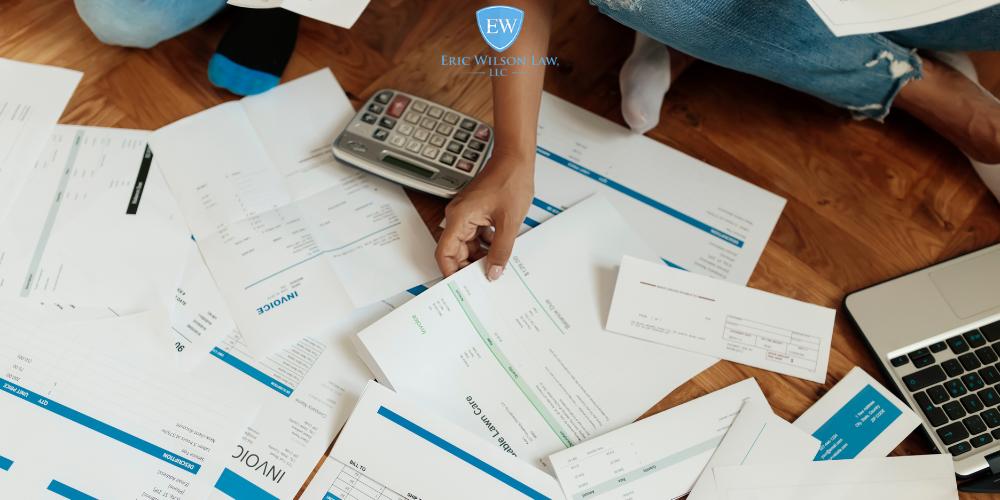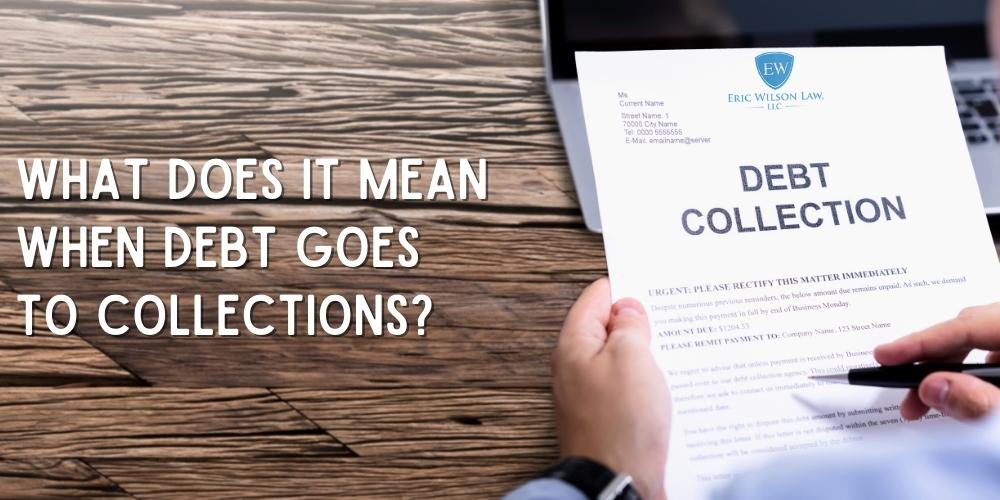When you fall behind on a credit card bill, a loan payment, or other type of outstanding debt, your outstanding balance may be picked up by a debt collection agency. From that point on, you may receive regular phone calls, letters, and other correspondence as the debt collectors attempt to recover the debt.
Having overdue debts is a stressful situation made even more so by the agencies attempting to collect payment. You may be wondering what to say to them. How will this affect your credit score? Is a payment plan possible? What will happen if I can’t pay back the money I owe?
When this happens to you, it’s helpful to know how debt collectors operate, and what legal rights you have. Here, our legal team at Eric Wilson Law will walk you through what happens when your debt is sent to collections, and what the potential aftermath might be.
For more information, give our Tuscaloosa office a call at 205-349-1280.
What are Collections?
First, let’s talk about what we mean when we say “collections.”
Debt collection agencies are third party companies that exist in order to, well, collect unpaid debt that a creditor (a credit card company, medical care provider, etc.) has not managed to collect. Individual debt collectors may work for agencies, or they may work independently. Some are also attorneys.
While some collections agencies will enter into contracts with creditors and work to recover the debt owed–this is called “assigned debt” — other agencies will purchase your debt from your creditors, usually for a fraction of debt face value. This is called “purchased debt.” The older your original debt, the cheaper it will be for new collections agencies to purchase it.
Once your creditor has either entered into a contract with a collections agency or sold your debt to one, the collections agency will use a variety of means to get in contact with you to convince you to make repayment. They will look into your assets to ascertain your ability to repay your unpaid debts. They may make reports to credit bureaus in order to bring down your credit score and encourage you to pay.
While collections agencies can use a variety of deceptive practices or persuasive techniques to convince you to pay up, they cannot seize your paycheck or take money without your consent, even if they were to acquire your bank account number, unless they acquire a judgment against you. To do this, they would have to take you to court and win. For the most part, a debt collector must find other ways to put pressure on a debtor and convince them to make payment.
When Does Debt Go To Collections?
When your debt goes unpaid for a period of time, usually around 30 days, it may be reported as delinquent. At that point, you will begin getting increasingly urgent notices from your creditor seeking repayment. You may receive phone calls, a written notice, or other recovery attempts from your original creditor.
Eventually, usually after 120 to 180 days of nonpayment, your original creditor–your bank, credit card issuer, medical care provider, whoever you owe money to–will give up trying to collect the debt from you. At that point, they will sell your debt to a debt collector in order to recoup some of their losses.
The types of debt most likely to go to a debt collector are credit card debt and phone debt, followed by utilities, auto loans, debts to the government, and medical debt.

How Debt Collections Work
Different debt collections companies specialize in different types of debt. Some may only deal in medical debt or credit card debt, while others may only deal in debt that’s a few years old. The collection process for your particular debt will depend on the type of debt you owe, the state you live in, and how much money you owe.
Once you have a debt in collections, like we mentioned earlier, the debt collectors will attempt to contact you to repay the debt. Collection agencies can come after old debts as soon as it’s sold to them by creditors, and may continue to do so indefinitely.
How Reputable Debt Collectors Operate
While some collection agencies operate on dubious ethical ground, many will follow the rules and attempt to collect money from past-due accounts in a professional manner.
These collection agencies will send letters and notices to the address you gave your creditors. If they discover you’ve moved, they will send notices to your new address. They will probably also call you. These collectors are required to tell you, whether over the phone or in writing:
- The name of the original creditor
- The amount you owe, including any late fees
- Your ability to dispute the debt
They need to tell you you have 30 days to dispute the debt in writing. They have to tell you the name and address of the creditor, if you ask for it. If you do not dispute the debt within 30 days, they will consider the debt valid, and will continue attempting to collect it. They must send you a debt validation letter before you pay anything.
These reputable debt collection companies will work within the statute of limitations, which will vary depending on the type of debt you owe. They will only contact you between 8 AM and 9 PM, although in those hours you may receive a barrage of collection calls. While their collection efforts may be persistent, they should not harass or threaten you. This is due not only to general business ethics, but also due to the Fair Debt Collection Practices Act, or FDCPA.
Because of the FDCPA, you as a consumer are allowed by federal law to sue a debt collector for harmful practices like threats, deception, or obscene language.
Debt Collections During COVID-19
Many states and many courts enacted protections during the COVID-19 crisis to protect debtors affected by the pandemic. Though most COVID protections are winding down in 2023, it’s important to understand that creditors and lenders want their money back, and are often willing to work with you if you’ve been impacted by COVID. If you’re struggling as a result of the pandemic, you can contact a lawyer for advice, and then more than likely contact your lender directly.
How Does Debt in Collections Affect Credit?
Most debt collectors will report your debt to a credit bureau, so it will, unfortunately, impact your credit score negatively. Generally, it will remain on your credit reports for up to seven years from the time the collections account originally became delinquent. The exception is any medical bills that are later paid by an insurer.
Can You Remove Collections From Your Credit Report?
If you do nothing, the collections debts will remain on your report for up to seven years even once you pay it, with the exception of a medical bill that has been paid by an insurer.
Some of the newer scoring models, like FICO, will ignore collections that have been paid. But FICO 8, which is the model that will be used by your mortgage lender or other potential creditors, will consider even paid-off collections if your original debt was over $100.
Like most other negative marks on your credit report, collections will hurt your credit, but the impact will lessen over time. There are also a few ways you can try to have paid collections removed from your credit report:
- Disputing the account if you believe there was an error, and you do not actually owe the debt
- Asking for a goodwill deletion if the debt has been paid
What To Do When Debt Goes to Collections
Once your debt goes to collections, as we’ve already discussed, the debt collector will use a variety of means to get in touch with you. Once this occurs, there are a few different paths open to you:
Negotiate a Settlement With the Debt Collector
If you have some cash on hand that you’re willing to part with, negotiating with the debt collector might be an option. Oftentimes, these collectors have purchased your debt for considerably less than its face value. If you owe $2,000, they might have paid half that or less to purchase your debt, depending on the type of debt and its age. If you have $1,000 on hand, you can offer it to them in a single payment, or try to work out a payment plan of some kind. The collections agency simply wants to make its money back, and settle the account.
If you’ve received threatening voicemails or a collections agent has been deceptive, you can potentially use that as leverage. One of the main downsides to this strategy is that, depending on your financial circumstances and the amount of money you owe, there may be tax consequences to settling a debt for less than what’s owed. Consult an attorney to determine if this strategy is right for you.
It is also important to note that you can settle a debt yourself, without a debt settlement company. Debt settlement companies act as middlemen between you and your creditors, but often charge hefty fees.
File for Bankruptcy
Filing for bankruptcy can be a powerful tool in achieving financial freedom. Though there are different types of bankruptcy, generally, filing for bankruptcy leads to the discharge of credit card debts, personal loans, utility payments, etc. Filing for bankruptcy will also cause debt collectors to stop contacting you.
Filing for bankruptcy will generally not discharge student loan debts or tax debts to the government. If you’re struggling with debt collection, talk to an experienced bankruptcy attorney to determine if filing for bankruptcy is the right option for you.
Create a Debt Management Plan
A debt management plan is a type of repayment plan that is set up and managed by a credit counselor. Once you have met with the counselor, they’ll look at your household budget and your payment history and negotiate with creditors on your behalf. As part of this negotiation, creditors may sometimes waive fees and lower the interest charges on your past-due accounts.
Like bankruptcy, a DMP will not include your student loans or secured debts like tax debt.

Call a Tuscaloosa Bankruptcy Lawyer at Eric Wilson Law Today
Being under the yoke of rapidly increasing debt payments is never easy. The collections process can be complicated and scary, and unpaid debt has the potential to impact your credit scores long term.
However, there are paths to financial freedom open to you. If you’re dealing with an unpaid debt that’s been sent to a collection agency, call Eric Wilson Law today. He will defend your legal rights and help you work towards a debt-free life.


